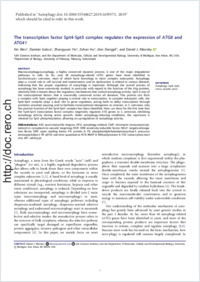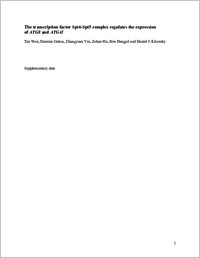The transcription factor Spt4-Spt5 complex regulates the expression of ATG8 and ATG41
- Wen, Xin Life Sciences Institute, and the Department of Molecular, Cellular and Developmental Biology, University of Michigan, Ann Arbor, MI, USA
- Gatica, Damián Life Sciences Institute, and the Department of Molecular, Cellular and Developmental Biology, University of Michigan, Ann Arbor, MI, USA
- Yin, Zhangyuan Life Sciences Institute, and the Department of Molecular, Cellular and Developmental Biology, University of Michigan, Ann Arbor, MI, USA
- Hu, Zehan Department of Biology, University of Fribourg, Fribourg, Switzerland
- Dengjel, Jörn Department of Biology, University of Fribourg, Fribourg, Switzerland
- Klionsky, Daniel J. Life Sciences Institute, and the Department of Molecular, Cellular and Developmental Biology, University of Michigan, Ann Arbor, MI, USA
-
29.08.2019
Published in:
- Autophagy. - 2019, vol. 0, no. 0, p. 1–14
English
Macroautophagy/autophagy, a highly conserved dynamic process, is one of the major degradative pathways in cells. So far, over 40 autophagy-related (ATG) genes have been identified in Saccharomyces cerevisiae, most of which have homologs in more complex eukaryotes. Autophagy plays a crucial role in cell survival and maintenance, and its dysfunction is related to various diseases, indicating that the proper regulation of autophagy is important. Although the overall process of autophagy has been extensively studied, in particular with regard to the function of the Atg proteins, relatively little is known about the regulatory mechanisms that control autophagy activity. Spt5 is one of the transcriptional factors that is universally conserved across all domains. This protein can form a complex with Spt4, together playing a central role in transcription. In complex eukaryotic cells, the Spt4-Spt5 complex plays a dual role in gene regulation, acting both to delay transcription through promoter-proximal pausing, and to facilitate transcriptional elongation. In contrast, in S. cerevisiae, only the positive function of the Spt4-Spt5 complex has been identified. Here, we show for the first time that the Spt4-Spt5 transcription factor complex negatively regulates ATG genes in S. cerevisiae, inhibiting autophagy activity during active growth. Under autophagy-inducing conditions, the repression is released by Spt5 phosphorylation, allowing an upregulation of autophagy activity.
- Faculty
- Faculté des sciences et de médecine
- Department
- Département de Biologie
- Language
-
- English
- Classification
- Biological sciences
- License
- License undefined
- Identifiers
-
- RERO DOC 327360
- DOI 10.1080/15548627.2019.1659573
- Persistent URL
- https://folia.unifr.ch/unifr/documents/308315
Other files
Statistics
Document views: 92
File downloads:
- den_tfs.pdf: 111
- den_tfs_sm.pdf: 113

